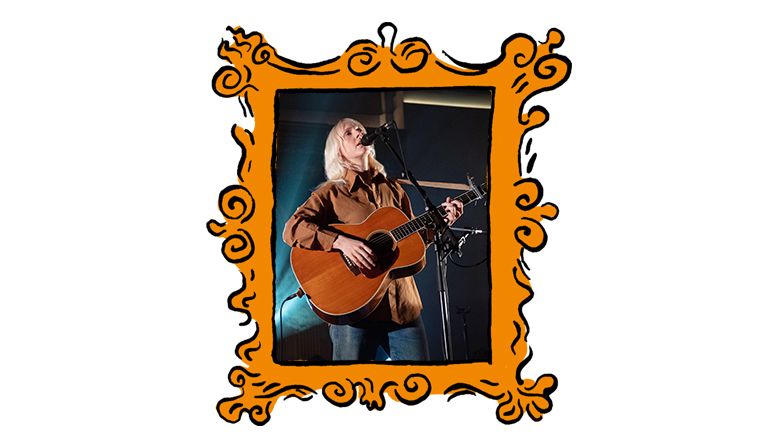The overlap of motherhood and creativity has been explored with a degree of tension in recent years. In her book Motherhood, Sheila Heti asked whether she would still be able to write if she had a child. Elsewhere, in A Life’s Work, Rachel Cusk wrote of the darkness she experienced during her first year as a mother. It was met with disdain. “If everyone were to read this book,” one reviewer wrote, “the propagation of the human race would virtually cease.” Together the books pose a philosophical conundrum for women artists—can one person’s artistry stretch to both offspring and art?
Laura Marling’s sublime eighth album, Patterns in Repeat, which was released last Friday, is an antidote to this line of thinking. The Hampshire-born songwriter gave birth to her first child, a daughter, in February 2023 and has said she felt “high as fuck” in the first days of motherhood. The experience made her anew. “I’m at the brow of the hill of womanhood,” she wrote in her Substack newsletter in July this year. “Maybe I even reached it in childbirth, when… I felt the familiar feeling of tripping, at one with the universe and all the women who had done this before me.”
That the experience brought Marling peace is audible on Patterns in Repeat, which continues the open-hearted, recorded-round-the-kitchen-table sound we heard on “For You”, the final track of her previous album, Song For Our Daughter (that record, released in 2020, was a kind of premonition). The new record’s first track, “Child of Mine”, begins with background noise—the gurgle of a baby, muttering, giggling—before Marling’s stoic guitar strums enter and she sings the first word, “You”, addressing her daughter.
There is an undeniable warmth to this opening song, which continues for the rest of the album. But it’s not sentimental. Just as Marling’s guitar-playing is anchored to the earth by a deep drone sound, her lyrics hold a lightness. “You and your dad are dancing in the kitchen/Life is slowing down but it’s still bitching,” runs that opening couplet.
Marling, who is now 34, recorded her Mercury Prize-nominated debut album, Alas, I Cannot Swim, before she turned 18. She spent those early years playing with Noah and the Whale, Mumford & Sons and Johnny Flynn. But while those other acts held onto the “nu-folk” label with which the press christened them, Marling sought to shrug off those connotations when she fled to the United States, living for a time in California, where she taught yoga, shaved her head and visited energy healers.
Marling has not abandoned the heady thinking that saturated her previous music. She completed a masters in psychoanalysis before giving birth, and her relationships with the writing of Henry Miller, Lucien Freud and Lou Andreas-Salomé pepper the writing on her Substack—and informed the songs on Patterns in Repeat. Becoming a parent has only deepened her understanding of her position in the world—what it means to be someone’s mother, daughter, friend.
The album features Marling’s version of “Looking Back”, a song her father wrote more than 50 years ago, imagining himself as an old man. “Today with age my body is bent/And against my will I must relent,” she sings, over lightly dissonant guitar and tender strings. The track is a particularly poignant inclusion given where Marling is in her life; in performing it now, she lets the echoes of her family’s previous generations reverberate through her and into the next.
Not all of these songs are about motherhood. On “Caroline”, Marling writes from the perspective of an older man who’s just heard from a long-ago lover, while on the unadulterated love song “No One’s Gonna Love You Like I Can”, there is a vulnerability to her voice as she sings over sparse piano. Still, on both tracks there is a sense of the songwriter weighing up what a life is worth, something on which parenthood puts a new spin. “All in all, I’ve been happy with my life,” she concludes on “Caroline”, while on “No One’s Gonna…” she muses, “And if life is just a dream, I’m gonna make it mean something worth a damn.”
We hear more echoes—this time of a riff from her 2013 album Once I Was an Eagle—on the title track, the album’s final song. For Marling fans, the warm cello sound will be reassuringly familiar, but the lyric is new. “I want you to know that I gave it up willingly/Nothing real was lost in the bringing of you to me,” she sings, well aware of what motherhood might have done to her art—and glad to have chosen it anyway.
On the mixing of motherhood and art
The musician Laura Marling says the birth of her daughter put her ‘at the brow of the hill of womanhood’. Her new album proves it
October 31, 2024

© Justin Ng / Alamy








